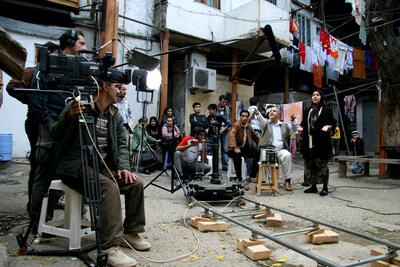Hassan Najafi, a visionary Iranian filmmaker, has established himself as a master storyteller in Iranian cinema, exploring themes of tradition, morality, identity, and resilience. His films resonate with both local and international audiences through their cultural authenticity and universal emotional depth. In Queen of Jijankooh (2017), Najafi presents a powerful drama set in rural Iran, highlighting the tension between cultural expectations and personal aspirations. Through stunning visuals and a heartfelt narrative, the film reflects themes of individuality and societal struggles. Sharafnaz (2016) portrays the resilience of individuals facing societal challenges, emphasizing perseverance, sacrifice, and the human spirit. The film stands out for its breathtaking cinematography and emotional storytelling, solidifying Najafi's reputation as a visionary director. In The Lost Share (2008), Najafi tells the moving story of Zeinab, an Azeri woman who becomes a pillar of strength for her community. The film explores themes of faith, hardship, and collective hope, offering a rich portrayal of cultural and emotional perseverance. Through these works, Hassan Najafi showcases his ability to blend universal struggles with Iranian cultural depth, making his films essential contributions to modern Iranian cinema.
LOS ANGELES, Dec. 19, 2024 /PRNewswire-PRWeb/ -- Hassan Najafi: A Visionary Filmmaker in Iranian Cinema
Introduction:
, a renowned Iranian filmmaker, has carved a distinctive place in the landscape of Iranian cinema. Known for his powerful storytelling, Najafi's work explores themes of morality, identity, and human resilience, deeply rooted in Iranian culture. With a filmography that includes visually striking and emotionally charged works, he has emerged as a storyteller whose films resonate with audiences both locally and internationally.
A Glimpse into Hassan Najafi's Films
1. (2017)
(2017), directed by , is a profound Iranian drama that delves into themes of tradition, individuality, and resilience. Set against the stunning rural landscapes of Iran, the film tells the story of individuals grappling with societal pressures, personal sacrifices, and the search for identity. Through its emotional narrative, the film portrays the delicate balance between cultural expectations and personal aspirations, making it a relatable and thought-provoking story.
Hassan Najafi's direction shines in Queen of Jijankooh, combining authentic storytelling with striking cinematography. The rural setting becomes a character in itself, reflecting both the beauty and challenges faced by the protagonists. Najafi's focus on cultural authenticity allows viewers to experience the richness of Iranian traditions while exploring universal struggles of human resilience and self-discovery.
The film has been praised for its emotional depth, strong performances, and its ability to highlight the complexities of rural life in Iran. As one of Hassan Najafi's most significant works, Queen of Jijankooh stands as a notable contribution to Iranian cinema, appealing to audiences both locally and internationally.
2.
Sharafnaz, directed by the renowned , is a captivating Iranian film that reflects the struggles and resilience of individuals in the face of societal challenges. Known for his focus on themes of morality, tradition, and identity, Hassan Najafi delivers yet another powerful work that resonates deeply with audiences.
The film explores the journey of its central characters, who navigate a world where cultural expectations and personal aspirations often collide. Through heartfelt storytelling, highlights themes of sacrifice, perseverance, and the strength of the human spirit. Najafi's skillful direction ensures that the emotional core of the story remains front and center, drawing viewers into the lives of the characters.
Visually, Sharafnaz stands out for its breathtaking cinematography, which captures both the beauty and struggles of rural Iranian life. The film's immersive visuals and authentic portrayal of Iranian culture make it a standout piece in Iranian cinema.
As with his previous works, Hassan Najafi masterfully combines cultural authenticity with universal themes, allowing Sharafnaz to connect with both local and international audiences. This film solidifies Najafi's reputation as a visionary director in Iranian cinema.
3.
The Lost Share (2008), directed and written by , is a deeply moving drama that explores themes of resilience, faith, and the power of human connection. The film follows Zeinab, an Azeri woman who, through suffering and hardship, emerges as a pillar of strength for her family and community during their most vulnerable times.
Zeinab's life revolves around her historic and religious roots, which give her the fortitude to endure life's challenges. Her greatest joy comes after years of waiting: the anticipated birth of her grandchild. However, tragedy strikes when the newborn is born with respiratory issues and has not cried since birth, while Sanam, Zeinab's daughter-in-law, faces life-threatening complications.
Amidst the turmoil, Zeinab's unwavering faith and selfless support of others come full circle. Those she had helped in the past rally around her, offering their prayers and presence, leading to signs of hope and recovery for the child.
Through its powerful narrative and emotional depth, The Lost Share reflects Hasan Najafi's storytelling mastery, portraying themes of perseverance and collective strength. The film highlights the cultural richness of Azeri life and resonates with audiences as a tale of hope amidst adversity.
Media Contact
Merx Forum, Merx Forum Inc, 1 (747) 314-2687, [email protected],
SOURCE





Share this article